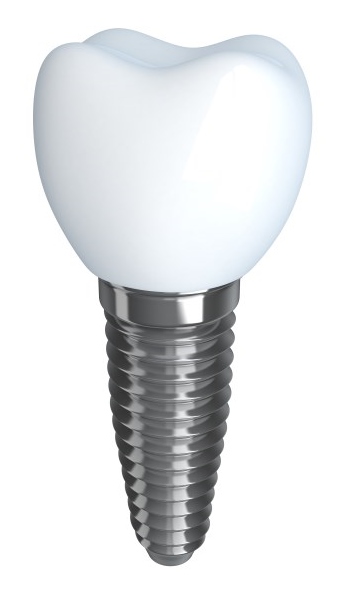PRINTED IN TCI WEEKLY NEWS
October 6th, 2012
If you have suffered tooth-loss whether due to cavities, gum disease or injury, it is likely that you would like to fill the gap or gaps that remain. For many years, the only treatment options available were either bridges or dentures. However, dental implants may be the best solution to replace those missing teeth. They offer the most technologically advanced and the closest-to-nature solution available to replace missing teeth.
What are dental implants?
Dental implants are metal (titanium) screw-like fixtures that are secured into your jaw bone and replace the missing root of a natural tooth. A porcelain crown is then attached to the implant that has the appearance of a normal, natural tooth. A single implant stands alone and it not attached to teeth on either side (unlike a bridge). Two or more implants can be used to carry a bridge in a situation where several teeth in a row are missing.

The procedure might sound a little scary but in general it takes less than an hour to place a single implant and is as painless as any routine treatment, such as a filling.
After an implant is placed, a healing period of 8-12 weeks is allowed, to enable the bone to heal, anchoring it securely into the jaw-bone. The implant is then restored (the crown placed). This is the final stage of the procedure.
The advantages of dental implants versus the alternatives
Implants are the closest-to-nature solution available to replace missing teeth; they look and feel like your own, natural teeth and you clean them in the same way. Titanium has a unique property in that bone will fuse with it, thus fixing the implant firmly and permanently into the jaw-bone. With sensible care many implants last a lifetime.
Unlike dentures, implants are not removable so they are more convenient and more comfortable; there is never the risk of them sliding when eating or clacking when speaking and the necessity to remove them to clean or at night is eliminated.
Implants do not require altering the adjacent teeth, as with a bridge. Therefore, more of your own teeth are left intact and healthy. Flossing is also possible with a single implant thus making it easier to maintain good oral hygiene.
When implants may not be the best option
If there has been significant bone-loss in the area where the tooth was, there may not be enough bone to support an implant. In this case, a bridge would be a more suitable solution. If a patient has gum disease this must be treated before an implant is placed and if a patient has an uncontrolled chronic disorder (such as diabetes) they would not be a suitable candidate until the disorder is being effectively managed. Finally, patients who smoke may not be suitable. This is due to the smoking negatively impacting the body’s ability to heal the bone at the site the implant is placed. Statistically the success of implant placement goes from 99% in non-smokers to 80% in smokers. If you are a smoker considering implants I recommend you have this discussion with your dentist.
Talk to your implant dentist
If you are considering implants it is likely that you will have more questions. Talk to your implant dentist and discuss the options and the best treatment plan to suit your requirements and budget.